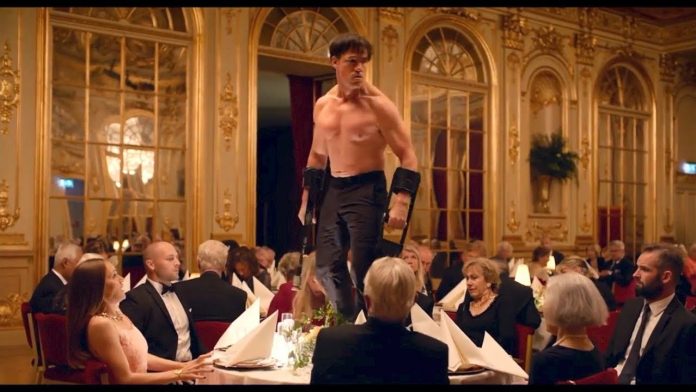IN May last year, Swedish director Ruben Ostlund won the Palme d’Or at the Cannes Film Festival.
The film which he won that award for has finally been released into UK cinemas and is The Square, an original, entertaining and often provocative satirical examination of the art scene in Stockholm.
The film focuses primarily on Christian (Claes Bang), the curator of the X-Royal which is about to unveil its latest exhibition known as The Square. Early on, he is interviewed by a journalist (Elisabeth Moss) where he highlights the need to maintain integrity by fending off rich people spending in a day on art what the museum spends in a year.
As the film progresses, Christian’s personal life gradually unravels as a series of unusual events take place. A theft of his wallet and subsequent ‘exposure’ of the thief brings him into conflict with an unexpected character and a night of passion is spoilt by a bizarre argument involving a condom.
The professional side is not spared either with problems ensuring for the museum, such as the Q&A of an artist (Dominic West) being interrupted by a Tourette’s sufferer, a viral video creating an avalanche of controversy and one of the most memorable dinner sequences in living memory, where an art exhibition goes horribly wrong.
Ostlund’s previous films have displayed both talent and frustration, with Play succeeding as an uncomforting look at juvenile behaviour but Force Majeure failing with its presentation of some of the most unlikeable characters from a film this decade. However with this delving into the often surreal world of art, Ostlund redeems for his previous failure, crafting a two and a half hour dramedy that stands as arguably the most enjoyable Palme d’Or winner since Blue is the Warmest Colour.
The film is stuffed with moments of awkward but memorable humour which is victorious at provoking debate. When observing the Q&A that is interrupted with progressively vulgar language, one cannot help but wince as the female interviewer looks down repeatedly in despair, while West’s interviewee is forced to put a brave face on, despite the apologies from the sufferer’s companion.
The ice is broken when a sympathetic attendee defends the guest reminding the audience they need to be more tolerant. It is a scene that may be best viewed with hands covering eyes because we feel we are there and it asks who would be brave enough to defend or criticize, whichever act they feel doing.
The scene that triggers the biggest debate though is set at a posh dinner where the attendees, West’s character included, are treated to a most unusual exhibition, a topless man who behaves like an ape (Terry Notary, who worked on the recent Planet of the Apes trilogy).
In a virtuoso sequence, the background laughs turn into terror as he picks on certain individuals, causing walkouts and an ending to the sequence that will make people wonder aloud what they have just witnessed.
Ostlund with this scene alone delivers an atmosphere of such surrealism that brings to mind Buneul’s The Discreet Charm of the Bourgeoisie and Greenaway’s The Cook, the Thief, His Wife and Her Lover, where dinner becomes a location of utter chaotic behavior.
In among all this, the film allows itself to provide adventure for the main character outside the workplace where life is far from comfortable. Early on, he walks on a busy street where a female screams for help owing to a man chasing her, leading to him and another passer-by preventing the pursuer who gives up, leaving them wondering what happened.
This theme of unpredictable activity benefits the film, such as later when the cowardly curator tries to persuade a colleague to post letters in an apartment block naming and shaming a supposed thief, having to settle with doing it himself whilst the colleague provides the getaway car. This then leads to a subplot where Christian receives a letter threatening him with chaos if he does not apologize to the person and their family, leading to several confrontations which engage mainly due to the public locations these take place in, particularly one terse scene in Christian’s apartment stairwell.
It also acts often as a social commentary where the issue of homelessness is explicitly detailed with the inclusion of several characters that Christian encounters, tying in with the explosive (literally) viral video which is itself a powerful look at representations of class.
In employing international actors, Ostlund manages to bring out a good role for Moss whose initial one-dimensional journalist becomes a more interesting part for the story and whose refusal to accept provides awkward but suitable arc to the characters involved.
One can understand why this film won the top prize at Cannes, The Square is a respectable satire of the arts world, providing a needed jab in the arm to its director whose provocative antics are strong enough to make you want to see more, sooner rather than later.
https://www.youtube.com/watch?v=bvvNVQdnQtc



























